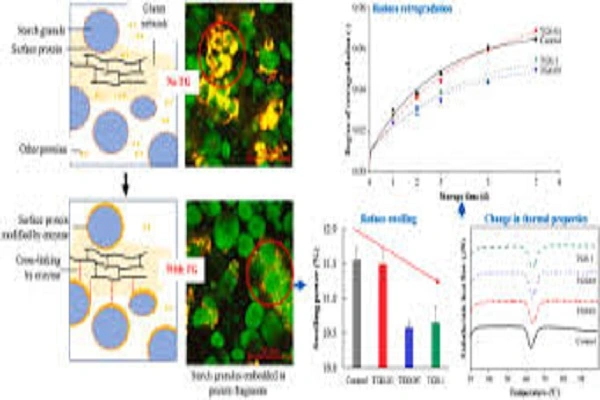Understanding Transglutaminase: The 'Meat Glue' Enzyme
Transglutaminase powder is an enzyme that catalyzes the formation of covalent bonds between proteins. This unique property allows it to "glue" protein-rich foods together, hence its colloquial name "meat glue." While it occurs naturally in plants, animals, and microorganisms, the commercial version is typically produced through fermentation of specific strains of bacteria.
The Science Behind Transglutaminase
At its core, transglutaminase works by creating cross-links between glutamine and lysine amino acid residues in proteins. This process, known as transamidation, results in a strong, irreversible bond. The enzyme's ability to form these bonds is what makes it so valuable in food production, particularly in restructuring meat products, improving texture in dairy items, and enhancing the quality of baked goods.
Historical Context and Development
The disclosure and separation of transglutaminase date back to the 1950s, but its commercial utilize in nourishment generation started in the late 1980s. Japanese analysts spearheaded the advancement of microbial transglutaminase, which cleared the way for its broad utilize in the nourishment industry. Since at that point, its applications have extended essentially, revolutionizing nourishment preparing strategies over different sectors.
FDA Regulations: How Transglutaminase Use is Monitored?
The use of transglutaminase powder in food production is subject to regulatory oversight to ensure consumer safety. In the United States, the Food and Drug Administration (FDA) plays a crucial role in monitoring and regulating its use.
FDA's Stance on Transglutaminase
The FDA has classified transglutaminase as "Generally Recognized as Safe" (GRAS). This designation means that qualified experts have concluded that the substance is safe under the conditions of its intended use. However, this doesn't mean its use is unregulated. The FDA requires that transglutaminase, like other food additives, be used in accordance with good manufacturing practices.

Labeling Requirements
While transglutaminase itself doesn't need to be listed on food labels, products that contain it must list "enzyme" as an ingredient. This requirement ensures transparency for consumers who may be looking to avoid certain additives. Additionally, if the enzyme is derived from a common allergen source, that allergen must be declared on the label.
International Regulations
Globally, the use of transglutaminase in food production is subject to varying regulations. The European Food Safety Authority (EFSA) has also evaluated transglutaminase and found no safety concerns when used as intended. However, regulations may differ in other countries, and food manufacturers must adhere to local laws and regulations when using this enzyme.
Culinary Applications vs. Potential Health Risks: A Balanced View
The use of transglutaminase powder in food production offers numerous benefits, but it's essential to weigh these against potential health considerations. Let's explore both sides of the equation to provide a balanced perspective.
Culinary Applications and Benefits
Transglutaminase has found widespread use in various sectors of the food industry due to its unique properties:
- Meat Processing: It allows for the creation of uniform portions, reduces waste, and can improve texture in processed meats.
- Dairy Products: In yogurt and cheese production, it can enhance firmness and reduce syneresis (whey separation).
- Baked Goods: It can improve dough elasticity and texture in bread and pastries.
- Seafood: It's used to create value-added products like imitation crab meat and to improve the texture of fish products.
- Plant-based Proteins: It aids in texture improvement in meat alternatives and plant-based dairy substitutes.

Potential Health Considerations
While transglutaminase is generally considered safe, there are some health considerations to be aware of:
- Allergic Reactions: Some individuals may be sensitive to enzymes, including transglutaminase. However, severe allergic reactions are rare.
- Celiac Disease: There have been concerns about transglutaminase potentially exacerbating celiac disease, but research in this area is ongoing and inconclusive.
- Bacterial Contamination: If not used properly, transglutaminase could potentially mask poor food handling practices by allowing the binding of separate pieces of meat, which could harbor bacteria if not cooked thoroughly.
Striking a Balance
The key to using transglutaminase safely lies in proper application and adherence to food safety guidelines. When used correctly, it can contribute to improved food quality, reduced waste, and innovative product development. However, it's crucial for food manufacturers to:
- Follow good manufacturing practices
- Adhere to regulatory guidelines
- Ensure proper labeling
- Maintain high standards of food safety and hygiene
By doing so, the benefits of transglutaminase can be harnessed while minimizing potential risks.

Conclusion
In conclusion, transglutaminase powder is a effective instrument in nourishment generation that, when utilized mindfully, can offer noteworthy benefits without compromising nourishment security. As with any nourishment added substance, it's vital to remain educated approximately its properties, applications, and administrative status. By understanding both its potential and its confinements, nourishment industry experts can make educated choices around its utilize, adjusting development with customer safety. As a trusted Transglutaminase Powder supplier, we are committed to providing high-quality, safe, and reliable ingredients to support your food innovation needs.
For undertakings creating wellbeing care items, makeup, chemical items, and nourishment added substances, remaining at the cutting edge of nourishment innovation whereas prioritizing security is foremost. If you're looking to join high-quality transglutaminase powder into your items or looking for master direction on its applications, Xi'an Reliable BioTech Co., Ltd. is here to help.
We pride ourselves on advertising premium transglutaminase powder that meets the most elevated quality measures. Our group of specialists is prepared to give comprehensive bolster, from item determination to application direction. We get it the one of a kind needs of the wellbeing nourishment, makeup, and nourishment added substance businesses, and we're committed to conveying arrangements that drive advancement whereas guaranteeing item security and efficacy.
Take the following step in hoisting your items. Contact us nowadays at allen@faithfulbio.com to learn more almost our transglutaminase powder and how it can advantage your trade. Let's work together to make items that not as it were meet but surpass industry measures and shopper expectations.
References
1.Motoki, M., & Seguro, K. (1998). Transglutaminase and its use for food processing. Trends in Food Science & Technology, 9(5), 204-210.
2.Kieliszek, M., & Misiewicz, A. (2014). Microbial transglutaminase and its application in the food industry. A review. Folia Microbiologica, 59(3), 241-250.
3.Gaspar, A. L. C., & de Goes-Favoni, S. P. (2015). Action of microbial transglutaminase (MTGase) in the modification of food proteins: A review. Food Chemistry, 171, 315-322.
4.Santhi, D., Kalaikannan, A., Malairaj, P., & Arun Prabhu, S. (2017). Application of microbial transglutaminase in meat foods: A review. Critical Reviews in Food Science and Nutrition, 57(10), 2071-2076.
5.Romeih, E., & Walker, G. (2017). Recent advances on microbial transglutaminase and dairy application. Trends in Food Science & Technology, 62, 133-140.
6.Gharibzahedi, S. M. T., Yousefi, S., & Chronakis, I. S. (2019). Microbial transglutaminase in noodle and pasta processing. Critical Reviews in Food Science and Nutrition, 59(2), 313-327.



